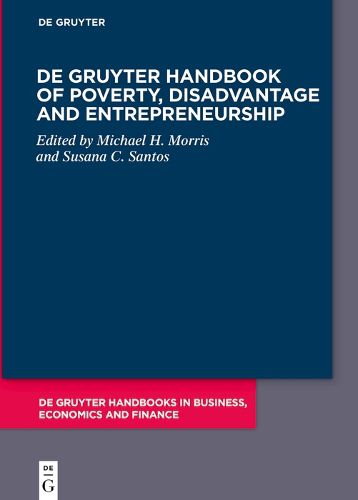Readings Newsletter
Become a Readings Member to make your shopping experience even easier.
Sign in or sign up for free!
You’re not far away from qualifying for FREE standard shipping within Australia
You’ve qualified for FREE standard shipping within Australia
The cart is loading…






Is entrepreneurship a pathway out of poverty? Does creating a business represent a means for improving one's life circumstances? Surprisingly little is known about ventures started by those in circumstances of poverty. This pioneering handbook integrates diverse perspectives from around the world regarding the poverty and entrepreneurship interface.
While the tendency among many scholars, economic developers, and policymakers is to downplay these ventures, arguing they are largely inefficient, marginal enterprises that create little innovation and few jobs, the chapters in this handbook demonstrate their significant contributions, and encourage societies to invest in their development.
The authors explore a range of factors affecting the ability of the poor to create enterprises that contribute to their well-being, including the role played by personal capabilities, education, family support and faith, availability of microfinance, technology, supportive community ecosystems and a munificent institutional environment. By shedding light on issues that can help nations realize the potential of these ventures, this volume demonstrates how entrepreneurship can serve as a source of empowerment, while providing direction regarding ways to surmount the obstacles that stand in the way.
$9.00 standard shipping within Australia
FREE standard shipping within Australia for orders over $100.00
Express & International shipping calculated at checkout
Is entrepreneurship a pathway out of poverty? Does creating a business represent a means for improving one's life circumstances? Surprisingly little is known about ventures started by those in circumstances of poverty. This pioneering handbook integrates diverse perspectives from around the world regarding the poverty and entrepreneurship interface.
While the tendency among many scholars, economic developers, and policymakers is to downplay these ventures, arguing they are largely inefficient, marginal enterprises that create little innovation and few jobs, the chapters in this handbook demonstrate their significant contributions, and encourage societies to invest in their development.
The authors explore a range of factors affecting the ability of the poor to create enterprises that contribute to their well-being, including the role played by personal capabilities, education, family support and faith, availability of microfinance, technology, supportive community ecosystems and a munificent institutional environment. By shedding light on issues that can help nations realize the potential of these ventures, this volume demonstrates how entrepreneurship can serve as a source of empowerment, while providing direction regarding ways to surmount the obstacles that stand in the way.